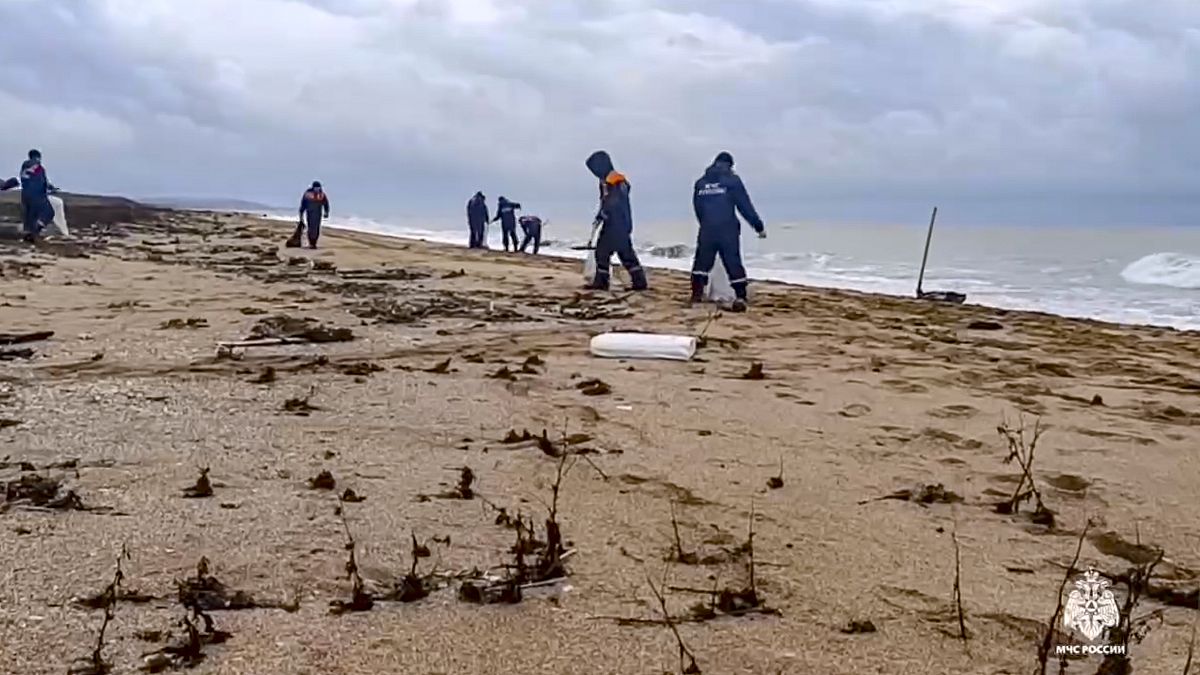Local authorities in the region where oil was detected on four beaches have swiftly responded to the situation with the help of volunteers, ensuring that the spill was promptly eliminated. Russia-appointed officials in occupied Crimea declared a regional emergency after oil was found on the shores of Sevastopol, the peninsula’s largest city. The oil spill originated from two stricken tankers that spilled fuel oil in the Kerch Strait, about 250 kilometers from Sevastopol. The regional governor announced the emergency regime on Telegram and reassured the public that there was no mass pollution of the coastline. This incident has raised concerns about the environmental impact and the need for stricter regulations on oil transportation in the region.
In response to the ongoing oil spill, authorities in Russia’s southern Krasnodar region declared a region-wide emergency last week as the fuel oil continued to wash up on the coastline after one tanker ran aground and the other was damaged. The cleanup efforts involved nearly 7,000 people working to remove over 96,000 tons of contaminated sand and soil along the shoreline. The regional governor, Veniamin Kondratyev, provided updates on the cleanup progress on Telegram and estimated that up to 200,000 tons of mazut, a heavy low-quality oil product, may have been contaminated. Russian President Vladimir Putin has acknowledged the severity of the situation, referring to the oil spill as an “ecological disaster.”
The Kerch Strait, where the oil spill occurred, serves as a vital global shipping route connecting the inland Sea of Azov to the Black Sea. The annexation of the Crimean Peninsula by Russia in 2014 has led to territorial disputes with Ukraine, which accused Russia of illegally seizing control of the area. The oil spill in the Kerch Strait has exacerbated tensions between the two countries, with Ukrainian officials denouncing the incident as a “large-scale environmental disaster” and calling for additional sanctions on Russian tankers. The proximity of the spill to Sevastopol, a strategic port city, has raised concerns about the potential impact on marine life and coastal ecosystems in the region.
The cooperation between local authorities and volunteers in responding to the oil spill demonstrates the importance of swift and efficient emergency measures in mitigating environmental disasters. The declaration of a regional emergency in Sevastopol and Krasnodar reflects the seriousness of the situation and the need for coordinated cleanup efforts to prevent further environmental damage. With ongoing cleanup operations and monitoring of the affected areas, it is crucial for authorities to assess the long-term impact of the oil spill on the marine environment and implement measures to prevent similar incidents in the future. The oil spill in the Kerch Strait serves as a reminder of the risks associated with oil transportation and the importance of sustainable practices to protect coastal ecosystems and biodiversity.
As the cleanup efforts continue in the aftermath of the oil spill, the focus remains on restoring the affected beaches and coastline while addressing the broader environmental implications of the incident. The regional governors in Sevastopol and Krasnodar are working closely with governmental agencies, volunteers, and environmental experts to ensure that the cleanup operations are conducted effectively and in accordance with environmental regulations. Public awareness and community engagement are essential in supporting the cleanup efforts and raising awareness about the potential risks of oil spills in sensitive marine environments. By prioritizing environmental protection and sustainable practices, local authorities can mitigate the impact of the oil spill and work towards restoring the affected ecosystems for future generations to enjoy. The collaboration between various stakeholders in responding to the oil spill exemplifies the importance of collective action in safeguarding the environment and promoting responsible stewardship of natural resources.











